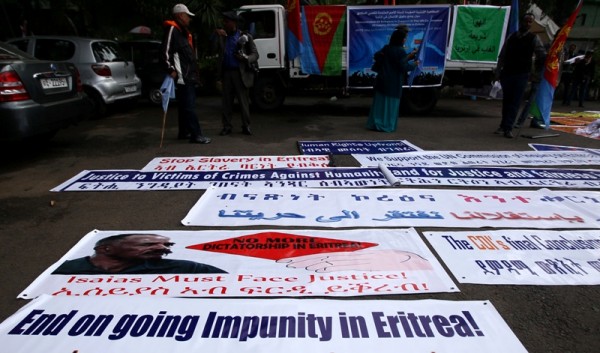His Excellency President Issaias Afeworki
c/o Permanent Mission to the United Nations
E-mail: [email protected]
Mr. Foazia Hashim
Minister of Justice
P.O. Box 241
Asmara
Eritrea
Fax: 0029 11 12 64 32
Vienna, 8 April 2002
Your Excellency,
The International Press Institute (IPI), the global network of editors, leading journalists and media executives, strongly condemns the Eritrean government’s inhumane treatment of independent journalists working within the country.
On the basis of information provided to IPI, nine journalists, who were arrested in the aftermath of the closure of all eight independent newspapers in Eritrea on 18 September 2001, continue to be held without charge and in appalling conditions. On 31 March, the nine journalists and a freelance photographer began a hunger strike as a protest against their illegal detention. In a letter smuggled out of the prison, the hunger strikers said they were seeking “justice before a fair and independent prison.”
Totally unable to accept criticism, the government of Isaias Afworki ordered the attack on the media after the publication of an open letter criticising the government for its lack of transparency and democracy. Written by officials in the administration, the letter incensed the government and led to a crack-down which saw several journalists flee the country in order to escape arrest. Eleven government officials were arrested for their alleged participation in the open letter.
The journalists on hunger strike are Yusuf Mohamed Ali, Mattewos Habteab, Dawit Habtemichael, Medhanie Haile, Temesgen Gebreyesus, Emanuel Asrat, Dawit Issac, Fessehaye Yohannes and Said Abdulkader. They have been joined in their protest by freelance photographer Seyum Tsehaye. Held in prison for over six months, the journalists have been questioned only once. During the interrogation, they were asked whether they knew the 11 government officials detained in September.
According to the Eritrean Journalists Association in Exile (EJAE), on 3 April four of the journalists were taken to an unknown location by two security officers, Colonel Gaym and Deputy Police Commissioner Colonel Simon. Dawit Isaac, a Swedish citizen of Eritrean origin, has been hospitalised under strict security. There are allegations that his need for medical aid is a direct result of his treatment in prison. He is currently in Halibet Hospital in Asmara undergoing surgery.
IPI notes that members of the Eritrean government have made a series of recent statements on the closure of the independent newspapers and press freedom in general. In a letter to a United State’s (US) newspaper, Eritrea’s ambassador to the US, Girma Asmerom, said newspapers in September had been “suspended for violating the press law”. He went on to say, “The government is taking appropriate measures to renew the revoked licenses and to issue new ones. The government’s commitment to the growth of a free press is still in place and movement in that direction is on track.”
With regard to these comments, IPI fundamentally disagrees with the Eritrean government. The detention of journalists without trial is a fundamental breach of human rights and is a sign that the present government is no respecter of the rule of law. Article 5 of the United Nations Universal Declaration of Human Rights clearly states, “No one shall be subjected to torture or to cruel, inhuman or degrading treatment or punishment”. In the opinion of IPI, the detention of the journalists for six months without charge and without the opportunity to apply for bail, together with their inhumane surroundings, amounts to “cruel, inhuman or degrading treatment”.
Bearing in mind the failure of the Eritrean authorities to charge the journalists, IPI also believes that article 9 of the United Nations Universal Declaration of Human Rights has been breached. Article 9 states, “No one shall be subject to arbitrary arrest, detention or exile”. The arrest of the journalists on the slimmest of possibilities that they may or may not be connected to other alleged offenders, without evidence to support this accusation, is an extreme example of an “arbitrary arrest”.
As a result, press freedom in Eritrea is not “on track” as stated by Asmerom, instead it has been decimated by a government that wishes to restrict it to the narrow margins of its own self-interest, thus avoiding legitimate criticism.
Concerning the government’s decision to create a special committee to consider the media, IPI believes that it lacks real intent. At a time when the independent press has been effectively banned, when many journalists have either left the country or remain detained in the harshest of conditions, it is difficult to believe that a balanced and objective examination can be undertaken. IPI is fearful that the examination will be used to justify the government’s own repressive views on press freedom.
Therefore, IPI calls upon Your Excellency in the strongest of terms to do everything possible to ensure that the journalists currently in detention are released forthwith. Furthermore, IPI invites you to remove the ban on the independent press and to allow journalists to report freely. By doing so you will be guaranteeing press freedom in Eritrea.
We thank you for your attention.
Best regards,
Johann P. Fritz
Director
For further inquiries on Eritrea, please contact David Dadge of the IPI Secretariat on Tel: +431-512 90 11 or E-mail: [email protected]

